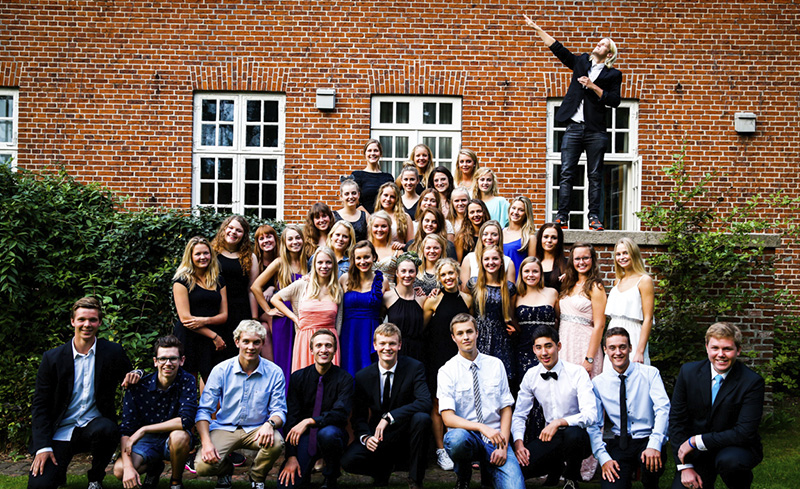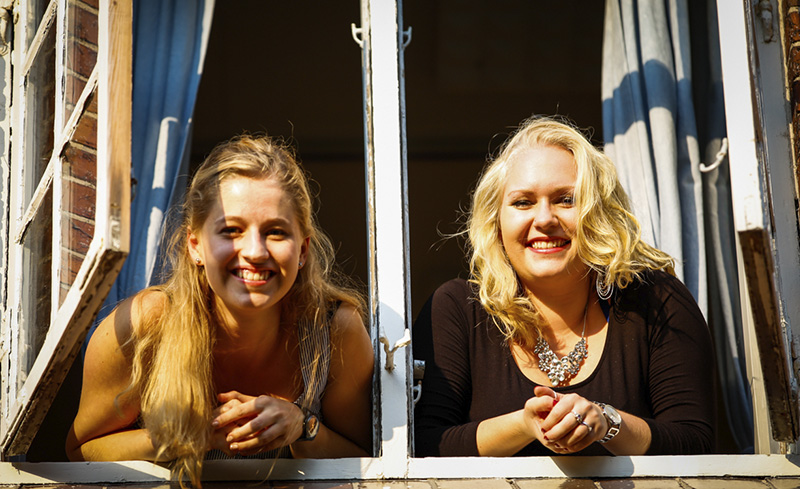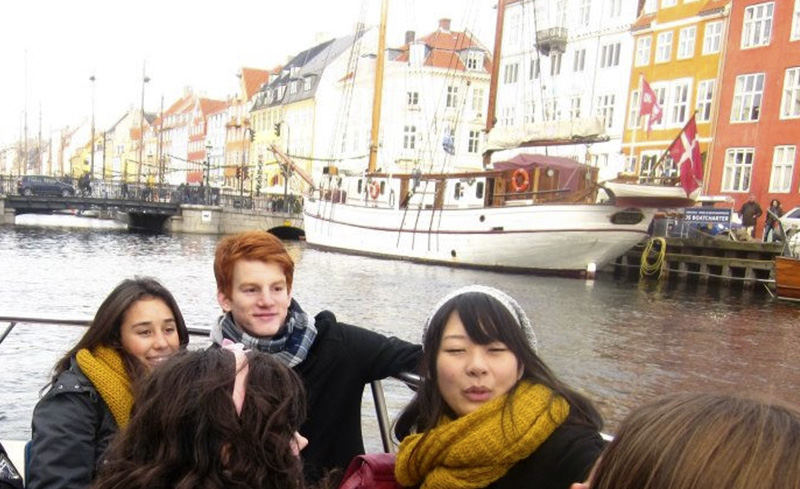Study in Denmark
Hygge (pronounced ‘hooga’) is a traditional Danish word meaning “creating a warm atmosphere and enjoying the good things in life with good people.” Hygge is probably the reason why Danes are the happiest people in the world! As a YFU student in Denmark, you’ll get to experience hygge wherever you go and whatever you do!
“That first week was one of the best ones of my life. Meeting people from all over the world made me someone more open and understandable. And I know the friendships… will be forever.”
– Antonino
+ More About Denmark
Hej! As a student in this Scandinavian country, you will undoubtedly experience many moments of what the Danes call hygge, a special word for comfort that means an all-embracing feeling of warmth and well-being.
Danish history dates back to 12,500 BC, and is home to the infamous Vikings whose stories and tales are still remembered. Danish people are dedicated to maintaining a green environment, and many use bicycles instead of automobiles. The Danish cuisine, due to its long winters, consists primarily of fish and other meats, which are said to prolong a person’s lifetime and improve their health. Several studies have named the Danes the happiest people in the world! The government and its services are geared towards supporting family life with public amenities, and the Danish government even funds college education for all its citizens. With Denmark taking care of your schooling needs, your education will undoubtedly be in good hands!
As a teenager in Denmark, you will have many opportunities to participate in fun and exciting activities. Soccer is by far the most popular sport in the country, brought to Denmark in the 19th century by British laborers. Water sports such as sailing are also quite popular in Denmark. You could also go to the cinema, and discover popular Danish genres such as folk comedy.
+ Scholarships Available
YFU USA is proud to send over 200 American students on cultural exchange with a full or partial scholarship each year. Financial assistance may be in the form of a merit-based scholarship, needs-based financial aid, or Legacy Grant for students who are previously involved in the YFU Community. Scholarships may vary in deadline, requirements, and eligibility.
Holcomb & Farnell Foreign Study Fund
YFU Legacy Grant
YFU Financial Aid Fund
Karla Topolka Scholarship Fund
Passport to Equity
+ Application Deadline
Applications for tuition based programs must be submitted by March 15 for summer and fall departures. Applications submitted after this date will be considered on a case by case basis depending upon availability.
+ Additional Information
Visa Information
Students must obtain a temporary residence permit (visa) from their designated Danish Embassy or Consulate prior to their arrival, a process which may take up to 3 months. The cost for the permit from the Danish Immigration Service is around $290 and is not covered in your program tuition. Fees associated with applying for a visa or residence permit are not included in the YFU program price. More information will be sent upon enrollment.
Additional Costs
Program tuition does not include visa fees or related costs or personal spending money. While many students may bike to school each day, some students will ride the bus. Students are required to cover any costs associated with transportation to and from school.
Important Information
If you will turn 18 during your exchange in Denmark, you will be charged a media license fee by the Danish Broadcasting Corporation if you have a computer, tablet, or smart phone with internet access.
Choose Your Program
+ Academic Year Programs
The Danish equivalent of high school is divided among three different types of schools: gymnasiums offer general academic education, business schools offer business and commercial studies, and technical schools offer technical and vocational training.
School
“Learning for life” is the philosophy at school in Denmark. This means that students always play a very active democratic role in lessons and very often assignments are given to be solved collaboratively in groups. The school day normally starts at 8 a.m. and finishes at 4 p.m. Many students will bring their laptop to class. After school, students typically hang out with friends or do homework. Danish students don’t usually wear uniforms and the dress code is quite liberal. As a new student, you may get a mentor to help you in the beginning, but you should be prepared to get actively involved and not wait for your classmates or teachers to tell you what to do.
Orientations
All students applying for the year program must be available for a mandatory 3-day National Pre-Departure Orientation, which usually takes place in mid-July. This orientation is a required part of the program aimed at preparing students for their experience overseas. All students will participate in a one-day local pre-departure orientation in May or June.
Once in Denmark, students will participate in a one week arrival orientation focused on Danish language and culture, and 3 day weekend mid-year orientation and re-entry orientation.
Age Requirement
- 2024 Fall Departures: Students born December 30, 2005 – July 31, 2008.
Language
Danish. Previous language study is not required, but encouraged. All students will receive basic language training during their 1-week arrival orientation. After the orientation, students can request information or training materials for private language lessons.
| PROGRAM | DEPARTURE | RETURN | FULL TUITION |
|---|---|---|---|
| 2024 Fall Year | Early August | Late June | $14,095 |
Tuition Includes
- Placement with a carefully selected host family
- Enrollment in a local Danish high school
- Airport transfers
- Domestic and international travel
- All pre-departure and post arrival orientations
- Pre-program support by trained YFU staff
- Support from a YFU Denmark Area Representative while on program
- Comprehensive insurance
Host Family Placement
Mostly in small towns or rural areas throughout the country. Students are normally not placed in large urban centers.
+ Academic Semester Programs
The Danish equivalent of high school is divided among three different types of schools: gymnasiums offer general academic education, business schools offer business and commercial studies, and technical schools offer technical and vocational training.
School
“Learning for life” is the philosophy at school in Denmark. This means that students always play a very active democratic role in lessons and very often assignments are given to be solved collaboratively in groups. The school day normally starts at 8 a.m. and finishes at 4 p.m. Many students will bring their laptop to class. After school, students typically hang out with friends or do homework. Danish students don’t usually wear uniforms and the dress code is quite liberal. As a new student, you may get a mentor to help you in the beginning, but you should be prepared to get actively involved and not wait for your classmates or teachers to tell you what to do.
Orientations
All students applying for the Semester program must be available for a mandatory 3-day National Pre-Departure Orientation, which usually takes place in mid-July. This orientation is a required part of the program aimed at preparing students for their experience overseas. All students will participate in a one-day local pre-departure orientation in May or June.
Once in Denmark, students will participate in a one week arrival orientation focused on Danish language and culture, and 3 day weekend mid-year orientation and re-entry orientation.
Age Requirement
- 2024 Fall Departures: Students born December 30, 2005 – July 31, 2008.
Language
Danish. Previous language study is not required, but encouraged. All students will receive basic language training during their 1-week arrival orientation. After the orientation, students can request information or training materials for private language lessons.
| PROGRAM | DEPARTURE | RETURN | FULL TUITION |
|---|---|---|---|
| 2024 Fall Semester | Early August | Early January | $13,095 |
Tuition Includes
- Placement with a carefully selected host family
- Enrollment in a local Danish high school
- Airport transfers
- Domestic and international travel
- All pre-departure and post arrival orientations
- Pre-program support by trained YFU staff
- Support from a YFU Denmark Area Representative while on program
- Comprehensive insurance
Host Family Placement
Mostly in small towns or rural areas throughout the country. Students are normally not placed in large urban centers.





